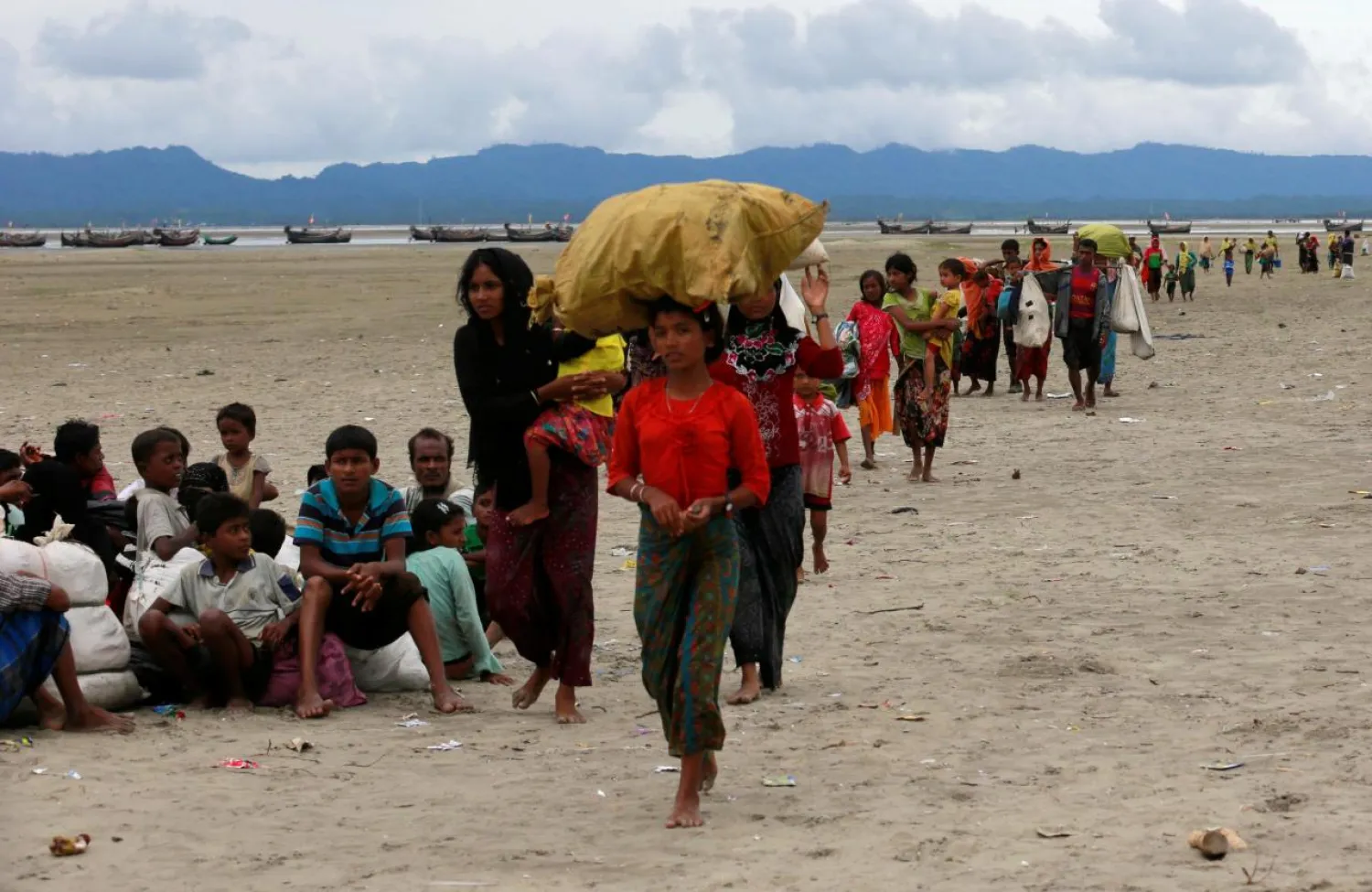The modern world has in recent days expressed concern over the atrocities committed by the Buddhists in Myanmar against Rohingya Muslims. The latest round of violence has forced tends of thousands to flee to safer areas on the border with Bangladesh.
Human Rights Watch has said that new satellite data is consistent with widespread burnings in Myanmar’s Rakhine State where the violence is raging.
According to Matthew Smith, the Chief Executive of Fortify Rights, a human rights organization, villages are burning and people are getting killed. The Rohingya are running for their lives, he said.
Myanmar’s authorities are claiming to be dealing with “terrorists” who are carrying out armed attacks in Rakhine, blaming the Arakan Rohingya Salvation Army (ARSA) for the latest round of violence.
They say only 450 people have been killed since August 25. But human rights activists have a different count of no less than 1,000 people, mainly unarmed civilians, dead.
The refugees and their horrendous stories
Nearly 400,000 refugees have poured across the border into Bangladesh. They have carried a handful of their personal belongings on their backs as they witnessed horrendous acts of violence, including rape, murder and organized looting.
UNHCR spokesperson Vivian Tan has lately said that a lot of women and children, including newborns, have been victims of violence and they need medical care for being very weak. The numbers are rising, she added.
Barefoot and running for her life, Rohingya Dilara, 20, reached Bangladesh in recent days clutching her young son, her family torn apart by violence in Myanmar.
“My husband was shot in the village. I escaped with my son and in-laws,” Dilara, 20, told the UNHCR as she trudged on mud-caked feet into Kutupalong refugee camp. “We walked for three days, hiding when we had to. The mountain was wet and slippery and I kept falling.”
Dilara lost track of her in-laws during the journey and followed her fellow villagers to the camp. “I don’t know where I am … I just knew to run to save my life,” she said in a daze, carrying her 18-month toddler and nothing else.
Who are the Rohingya?
Currently, about 1.1 million Rohingya who live in Myanmar. They are an ethnic group who have lived for centuries in the majority Buddhist Myanmar, formerly known as Burma. They are mainly concentrated in Rakhine, which is one of the country’s poorest states.
They are not considered one of the country's official ethnic groups and have been denied citizenship in Myanmar since the 1980s which has rendered them stateless.
As a result, the long-running tension between the Rohingya and the Buddhists led to bloody violence in the country's west in 2012, causing casualties and forcing tens of thousands of the minority group to flee to Bangladesh, Malaysia, Thailand, India and Indonesia.
Accusations against International Organizations
Myanmar leader Aung San Suu Kyi’s office has accused international aid workers of helping “terrorists”, a claim that has prompted fears for their safety.
The US Ambassador to Myanmar Scot Marciel rejected suggestions by the Myanmar government that international aid agencies—including the US Agency for International Development (USAID)—are supporting the Rohingya, describing the accusations as “absurd.”
UN Secretary-General Antonio Guterres has said that ethnic cleansing is taking place in Myanmar.
A Role for Kofi Annan
Former UN chief Kofi Annan is now in Myanmar to hand over the final report of a commission on Rakhine that he leads.
Suu Kyi established the nine-member Advisory Commission on Rakhine State on August 23, 2016.
The commission recommends that the government take concrete steps to end enforced segregation of Rakhine Buddhists and Rohingya Muslims; ensure full and unfettered humanitarian access throughout the state; tackle Rohingya statelessness and “revisit” the 1982 Citizenship Law.
Suu Kyi’s Silence
Human rights organizations, including Human Rights Watch, believe that the de-facto leader’s silence on the spiraling abuses against the Rohingya Muslim minority is unjustified and completely wrong.
An Indian analyst on Myanmar relations said however that Suy Kyi, who is known to be active in the field of human rights, is facing a dilemma. “She does not want to lose the support of the Buddhist majority in announcing her support for the Rohingya.”
“The situation will be very complicated,” he said.
















